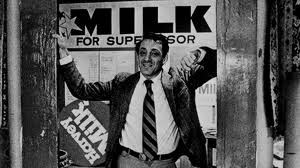Harvey Milk's Life Before Politics
Milk was born in New York in 1930 to a small Jewish family. In school, he was a well-liked, intelligent student growing up; he was involved in many extracurricular activities as he played football and sang in his high school's opera program.
After graduating from the New York State College for Teachers in 1951, Harvey Milk joined the Navy as a diving instructor during the Korean War. After he was discharged in 1955, Milk moved to New York City where he worked a variety of jobs: public school teacher, production associate for Broadway musicals, stock analyst, Wall Street investment banker. However, in 1972 he became bored with life in New York and decided to move to San Francisco where he opened a camera shop on Castro Street, the heart of the city's gay community.
 Harvey Milks Life in Politics:
Harvey Milks Life in Politics:Before his move to San Francisco, Milk remained private about his homosexuality. Even with the budding gay rights movement, he chose to remain on the sidelines. However, as his camera shop, Castro Camera, became a neighborhood center, Milk found his voice as a gay rights activist and leader. In 1973, he declared his candidacy for a position on the San Francisco Board of Supervisors. But, as a green politician with little financial support, Milk lost the election. This loss did not deter him from running again two years later, and again he lost the second election. By his third run, Milk had become a political force to be reckoned with as he was an outspoken leader for San Francisco's gay community and had supporters in George Moscone, Willie Brown, and Dianne Feinstein. His campaign focused not only on gay rights, but also child care, housing, a civilian police review board, etc. In 1977, Harvey Milk finally won a seat on the San Francisco City-County Board. On his inauguration day on January 9, 1978, Harvey Milk became San Francisco's first openly gay officer and one of the country's first openly gay individuals to be elected to office.
Assassination:
Milk's ascension came at a time where homosexuality was still regarded as a mental illness by medical professionals. However, San Francisco's mayor, George Moscone, was extremely liberal and was an avid supporter of gay rights which prompted him to abolish the city's anti-sodomy law.
On the other side of Moscone, was Dan White, a conservative who saw these liberal alterations as a breakdown of traditional values and was troubled by the growing acceptance of homosexuality. He often clashed with the much more liberal Milk on policy issues.
After a year in office, White decided to resign as he was unable to support his family on the small salary that the job offered. But, encouraged by his supporters, he asked Moscone to reappoint him; Moscone refused as he--and other board members--wanted to appoint a more liberal individual to his seat.
On November 27, 1978, White entered City Hall with a gun. He began arguing with the mayor and again asked to be reappointed, and when he was refused, he shot Moscone four times. He then went down the hall and found Milk, shooting him five times. Very soon after the shooting, he went to the police station and turned himself in.
Harvey Milk was and still is one of the most revered and respected members of the gay community. He made revolutionary steps towards equality and will go down in history as one of America's most influential politicians.

No comments:
Post a Comment